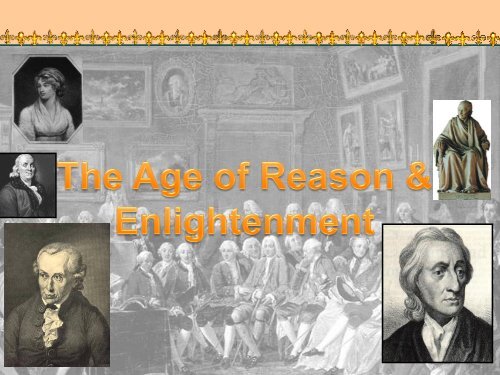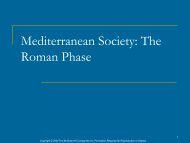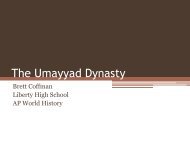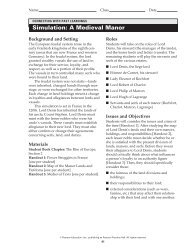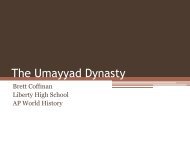The Age of Reason & Enlightenment
The Age of Reason & Enlightenment
The Age of Reason & Enlightenment
You also want an ePaper? Increase the reach of your titles
YUMPU automatically turns print PDFs into web optimized ePapers that Google loves.
What is “<strong>Enlightenment</strong>?”<br />
<strong>Reason</strong><br />
& Logic<br />
e rationalism<br />
e empiricism<br />
e tolerance<br />
e skepticism<br />
e Deism<br />
Traditions<br />
and<br />
Superstitions<br />
e nostalgia for the<br />
past<br />
e organized religions<br />
e irrationalism<br />
e emotionalism<br />
Immanuel Kant –-- DARE TO KNOW!
Centers <strong>of</strong> the <strong>Enlightenment</strong>
Critical Ideas Behind the <strong>Age</strong> <strong>of</strong> <strong>Reason</strong><br />
<strong>The</strong> ability to reason is what makes humans<br />
unique.<br />
• <strong>Reason</strong> can be used to solve problems and improve peoples lives.<br />
<strong>The</strong> natural world is governed by laws that can be<br />
discovered through reason.<br />
• <strong>Reason</strong> can free people from ignorance, superstition and unfair<br />
government.<br />
Like the natural world human behavior is governed by<br />
natural laws.<br />
• Governments should reflect natural laws and encourage education<br />
and debate.
<strong>Reason</strong> vs. Superstition<br />
Cause and<br />
Effect<br />
Fate<br />
People who believe in reason – believe that they can<br />
control their own lives. <strong>The</strong>ir decisions determine what will<br />
happen to them. <strong>The</strong>y deal with outside forces in their lives<br />
and try to overcome obstacles.<br />
People who believe in fate think that things just happen to<br />
them for no reason. <strong>The</strong>y are the victim or recipient <strong>of</strong> some<br />
great mystery. Life, therefore has very little meaning.
<strong>The</strong> Impact <strong>of</strong> Science<br />
Exploring Political Ideas<br />
Scientific Method<br />
• Pr<strong>of</strong>oundly influenced political theory.<br />
• Political thinkers began to look at<br />
natural law as a background for all<br />
laws.<br />
• Is there ever a problem with just<br />
following REASON?
A Parisian Salon
Madame Ge<strong>of</strong>frin<br />
(1699-1777)<br />
<strong>The</strong> Salonnieres<br />
Mademoiselle<br />
Julie de<br />
Lespinasse<br />
(1732*-1776)<br />
Madame<br />
Suzanne Necker<br />
(1739-1794)
A Parisian Salon<br />
•Salons promoted new<br />
ideas<br />
•Were a center for<br />
intellectual activity<br />
•Social gatherings<br />
brought together<br />
artists, philosophers,<br />
scientists, and writers<br />
to discuss their ideas.<br />
•Women were the<br />
impetus for these<br />
gatherings.
<strong>The</strong> Impact <strong>of</strong> Science<br />
Hobbes Explores Government<br />
• 1651 he wrote<br />
Leviathan – about the<br />
English Civil War<br />
• Believed government<br />
imposed order, and<br />
prevents violence.<br />
• He preferred a<br />
monarchy.<br />
• Came up with the idea<br />
<strong>of</strong> Social Contract.
Hobbes's beliefs<br />
• Hobbes believed people<br />
were born evil and<br />
needed government to<br />
keep them from living<br />
lives <strong>of</strong> selfishness and<br />
greed.<br />
• What do you think?
John Locke (1632-1704)<br />
►Locke believed people<br />
were born good and that<br />
governments were bad.<br />
►Believed all people were<br />
born equal and later<br />
established classes, rich<br />
and poor, etc….<br />
►People have the right to<br />
overthrow a government<br />
that does not protect their<br />
rights.
John Locke (1632-1704)<br />
► Locke agrees with the<br />
social contract, only he<br />
argues that people have<br />
natural rights. Life, Liberty<br />
and property that no one<br />
could take away.<br />
►People create<br />
governments to protect<br />
natural rights; if a gov’t fails<br />
to protect those rights the<br />
people have the right to<br />
overthrow the gov’t.
John Locke’s Philosophy (I)<br />
► <strong>The</strong> individual must become a “rational<br />
creature.”<br />
► Virtue can be learned and practiced.<br />
► Human beings possess free will.<br />
- they should be prepared for freedom.<br />
- obedience should be out <strong>of</strong> conviction,<br />
not out <strong>of</strong> fear.<br />
► Legislators owe their power to a contract<br />
with the people.<br />
► Neither kings nor wealth are divinely<br />
ordained.<br />
►Wrote Two Treatises <strong>of</strong> Civil Government
John Locke’s Philosophy (II)<br />
► <strong>The</strong>re are certain natural rights<br />
that are endowed by God to all<br />
human beings.<br />
- life, liberty, property!<br />
► <strong>The</strong> doctrine <strong>of</strong> the Divine Right<br />
<strong>of</strong> Kings was nonsense.<br />
► He favored democracy as the best<br />
form <strong>of</strong> government.
Jean-Jacques Rousseau (1712-1778)<br />
►Believed people were<br />
born good and society<br />
corrupted people.<br />
►Individuals should give<br />
up individual freedoms for<br />
the good <strong>of</strong> the community.<br />
►He despised inequality<br />
and would inspire<br />
revolutionaries for<br />
generations to come.
Jean-Jacques Rousseau (1712-1778)<br />
►Everywhere man is<br />
born free, and<br />
everywhere man is in<br />
chains.<br />
►Criticized the<br />
<strong>Enlightenment</strong><br />
►People should rely<br />
on emotion and<br />
instinct.
Jean-Jacques Rousseau (1712-1778)<br />
►Social Contract<br />
►Sovereignty comes<br />
from the people.<br />
►He believed in<br />
Democracy.
<strong>The</strong> Baron de Montesquieu (1689-<br />
1755)<br />
► Persian Letters,<br />
1721<br />
► On the Spirit <strong>of</strong><br />
Laws, 1758
<strong>The</strong> Baron de Montesquieu<br />
• <strong>The</strong> idea <strong>of</strong> separation<br />
<strong>of</strong> powers.<br />
– Executive powers –<br />
enforce laws<br />
– Legislative powers –<br />
make laws<br />
– Judicial powers –<br />
interpret laws<br />
• This limits the<br />
government’s power.<br />
• He favored a Republic
<strong>The</strong> Philosophe<br />
► polymathic --– broad knowledge<br />
► autonomous –-- beholden to no one.<br />
► sociable –-- worked with other<br />
philosophes.<br />
► moral obligation –-- improve society.<br />
- find the most just and efficient<br />
“systems.” (economic, political,<br />
social)
Immanuel Kant (1724-1804)<br />
► Critique <strong>of</strong> Pure<br />
<strong>Reason</strong>, 1781<br />
► “What is<br />
<strong>Enlightenment</strong>?”, 1784<br />
► Metaphysical<br />
Foundations <strong>of</strong><br />
Natural Science, 1786
Immanuel Kant (1724-1804)<br />
• <strong>Reason</strong> without<br />
religion is a bad<br />
idea.<br />
• Deism is not good.<br />
• Deists believed<br />
that God created<br />
the world and then<br />
left it alone.
Thomas Paine (1737-1809)<br />
► Common Sense,<br />
1776<br />
► <strong>The</strong> Rights <strong>of</strong> Man,<br />
1791
<strong>The</strong> American “Philosophes”<br />
John Adams<br />
(1745-1826) Ben Franklin<br />
(1706-1790)<br />
Thomas<br />
Jefferson<br />
(1743-1826)<br />
…...…life, liberty, and the pursuit <strong>of</strong> happiness…………...
New Social Issues<br />
• Religious toleration –<br />
philosophers begin to<br />
question real equality.<br />
• Women’s Rights –<br />
women begin to ask<br />
questions about their<br />
own rights<br />
• Economics – the end <strong>of</strong><br />
mercantilism and the<br />
beginning <strong>of</strong> capitalism.
Voltaire (1712-1778)<br />
► Essay on the Customs<br />
and Spirit <strong>of</strong> Nations,<br />
1756<br />
► Candide, 1759<br />
► Philosophical<br />
Dictionary,<br />
1764
Voltaire’s “Wisdom” (I)<br />
► Every man is guilty <strong>of</strong> all the good he<br />
didn’t do.<br />
► God is a comedian playing to an<br />
audience<br />
too afraid to laugh.<br />
► If God did not exist, it would be<br />
necessary<br />
to invent him.<br />
► It is dangerous to be right when the<br />
government is wrong.<br />
► Love truth and pardon error.
Voltaire’s “Wisdom” (II)<br />
► Judge <strong>of</strong> a man by his questions rather than<br />
by his answers.<br />
► Men are equal; it is not birth, but virtue<br />
that makes the difference.<br />
► Prejudice is opinion without judgment.<br />
► <strong>The</strong> way to become boring is to say<br />
everything.<br />
► I may not agree with what you have to say,<br />
but I will defend to the death your right to<br />
say it.
Voltaire (1712-1778)<br />
• Believed in religious<br />
tolerance.<br />
• Made famous by taking<br />
up the cause <strong>of</strong> Jean<br />
Calas.<br />
• His views gave us our<br />
modern version <strong>of</strong><br />
freedom <strong>of</strong> religion.
Denis Diderot (1713-1784)
Diderot’s Encyclopédie
<strong>The</strong> Encyclopédie<br />
► Complete cycle <strong>of</strong><br />
knowledge…………...…<br />
change the general way <strong>of</strong> thinking.<br />
► 28 volumes.<br />
► Alphabetical, cross-referenced,<br />
illustrated.<br />
► First published in 1751.<br />
► 1500 lires a set.
Subscriptions to Diderot’s<br />
Encyclopedie
<strong>The</strong> Encyclopédie<br />
• Spread the <strong>Enlightenment</strong> ideas to a vast<br />
audience.<br />
► Literacy:<br />
- 80% for men; 60 % women.<br />
► Books were expensive (one day’s wages).<br />
► Many readers for each book (20 : 1)<br />
- novels, plays & other literature.<br />
- journals, memoirs, “private lives.”<br />
- philosophy, history, theology.<br />
- newspapers, political pamphlets.
Mary Wollstonecraft<br />
► Believed men<br />
and women should<br />
be equal.<br />
►First to use the<br />
<strong>Enlightenment</strong> to<br />
increase feminism.<br />
►A Vindication <strong>of</strong><br />
the Rights <strong>of</strong><br />
Woman
Capitalism: Laissez-Faire<br />
► Adam Smith<br />
- 1776 --– <strong>The</strong> Wealth <strong>of</strong> Nations<br />
e Pr<strong>of</strong>it motive.<br />
e Division <strong>of</strong> labor.<br />
e Private ownership <strong>of</strong><br />
property.<br />
e Law <strong>of</strong> Supply & Demand.<br />
e Law <strong>of</strong> Competition.<br />
e Free trade.
Reading During the <strong>Enlightenment</strong><br />
► Literacy:<br />
- 80% for men; 60 % women.<br />
► Books were expensive (one day’s<br />
wages).<br />
► Many readers for each book (20 : 1)<br />
- novels, plays & other literature.<br />
- journals, memoirs, “private lives.”<br />
- philosophy, history, theology.<br />
- newspapers, political pamphlets.
Frederick the Great <strong>of</strong> Prussia<br />
• Supported freedom <strong>of</strong> the<br />
Press<br />
• Made the government more<br />
efficient<br />
• Backed religious tolerance<br />
• Made it illegal to torture<br />
people to get them to confess.
Russian Expansionism in the Late 18c
Catherine the Great (r. 1762-1796)<br />
• Reformed government and some<br />
laws<br />
•Criticized serfdom – then<br />
clamped down on the serfs<br />
•Abolished torture and allowed<br />
religious tolerance.
Catherine the Great<br />
• Built up the Russian Middle Class.<br />
• Brought down trade barriers with other<br />
countries.<br />
• She had to be very careful not to make the<br />
nobles angry so that she would stay in power.<br />
• This limited her ability to make huge reforms.
<strong>The</strong> Partitions <strong>of</strong> Poland<br />
- 1772<br />
- 1793<br />
- 1795
Maria <strong>The</strong>resa <strong>of</strong> Austria<br />
• Reduced the amount <strong>of</strong><br />
work a landholder could<br />
ask from a peasant.<br />
• Increased her own<br />
power and used her<br />
power to help the<br />
peasants in the country.<br />
• Made taxes fair for all<br />
people in Austria<br />
• Taxed nobles and clergy
Joseph II <strong>of</strong> Austria (r. 1765-1790)<br />
• Ruled with his mother<br />
until her death.<br />
• Increased his own<br />
power to help the<br />
people.<br />
• Freed all the peasants.<br />
• Limited the Catholic<br />
Church’s influence.<br />
• Enforced religious<br />
tolerance.
<strong>The</strong> Legacy <strong>of</strong> the<br />
<strong>Enlightenment</strong>?<br />
1. <strong>The</strong> democratic revolutions begun in<br />
America in 1776 and continued in<br />
Amsterdam, Brussels, and especially in<br />
Paris in the late 1780s, put every Western<br />
government on the defensive.<br />
2. Reform, democracy, and republicanism had<br />
been placed irrevocably on the Western<br />
agenda.
<strong>The</strong> Legacy <strong>of</strong> the<br />
<strong>Enlightenment</strong>?<br />
3. New forms <strong>of</strong> civil society arose –-- clubs,<br />
salons, fraternals, private academies, lending<br />
libraries, and pr<strong>of</strong>essional/scientific<br />
organizations.<br />
4. 19c conservatives blamed it for the modern<br />
“egalitarian disease” (once reformers began<br />
to criticize established institutions, they<br />
didn’t know where and when to stop!)
<strong>The</strong> Legacy <strong>of</strong> the<br />
<strong>Enlightenment</strong>?<br />
5. It established a materialistic tradition based<br />
on an ethical system derived solely from a<br />
naturalistic account <strong>of</strong> the human condition<br />
(the “Religion <strong>of</strong> Nature”).<br />
6. <strong>The</strong>oretically endowed with full civil and legal<br />
rights, the individual had come into existence<br />
as a political and social force to be reckoned<br />
with.
<strong>The</strong> Royal Academy <strong>of</strong> Sciences,<br />
Paris
Zoology & Biology<br />
A dissection at the Royal Academy,<br />
London.
Chemistry Labs & Botany Gardens
Natural History Collections<br />
► Cocoa plant drawing.<br />
► Sir Hans Sloane<br />
(1660-1753).<br />
► collected from Jamaica.
Natural History Collections<br />
James Petiver’s Beetles<br />
(London apothecary)
Private Collections<br />
<strong>The</strong> Origins <strong>of</strong> Modern Museums.


